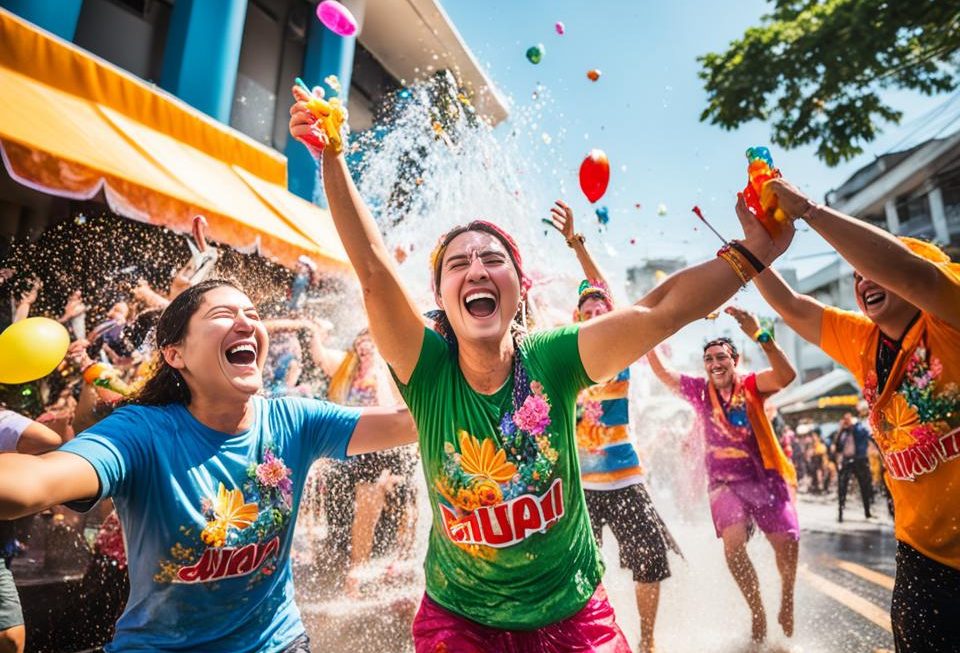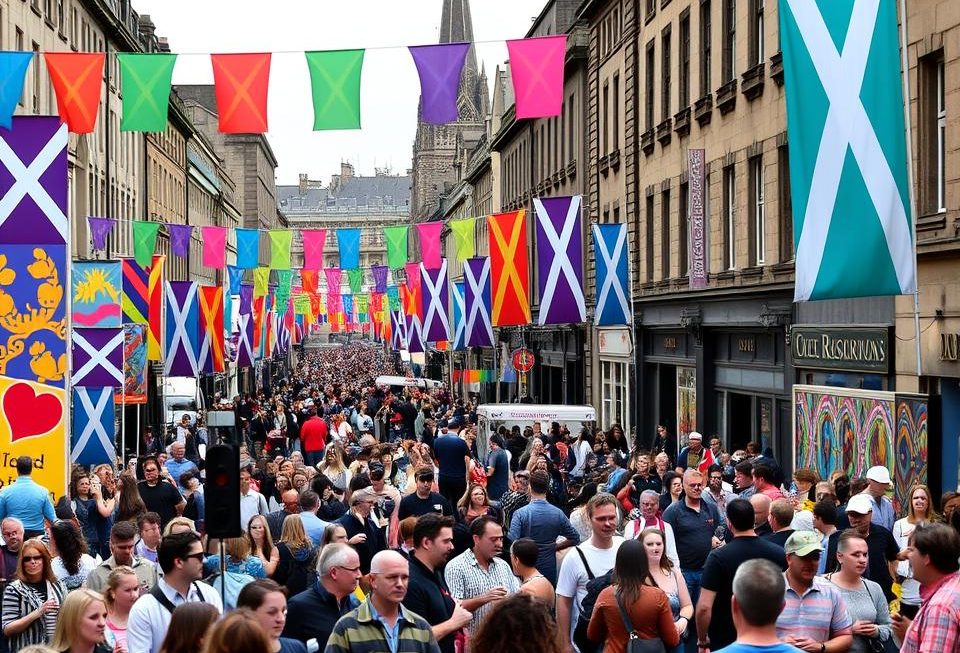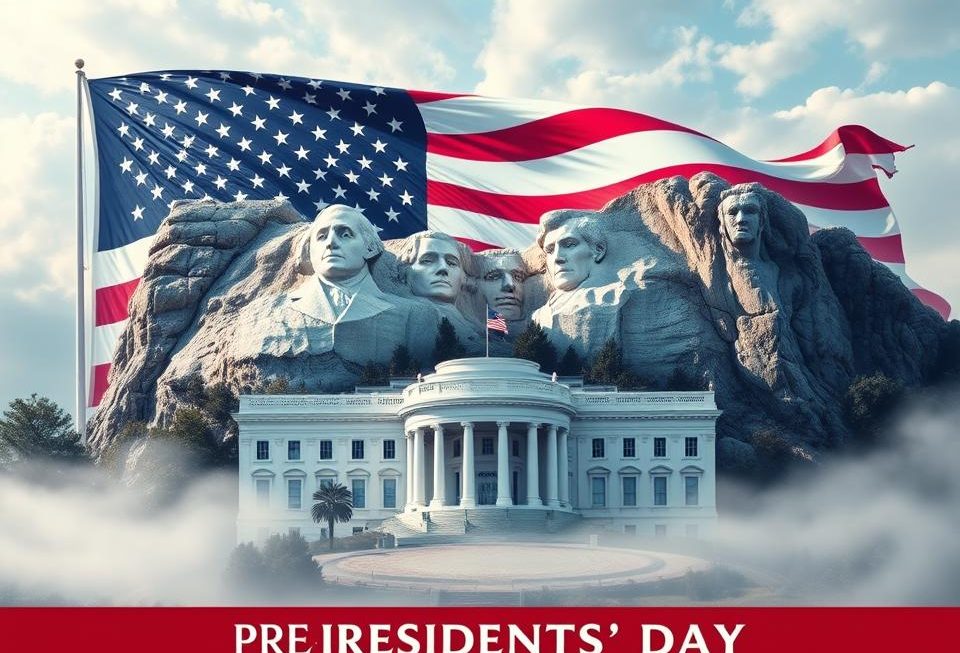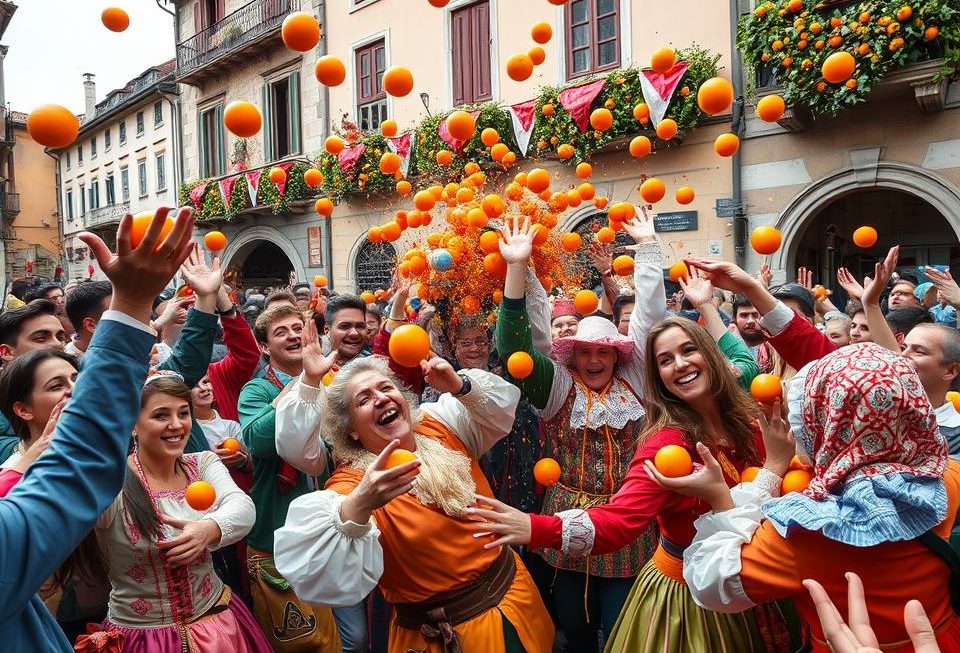Songkran is the traditional Thai New Year festival, celebrated annually in mid-April across Thailand. This vibrant celebration marks the beginning of the Thai solar calendar and is known for its lively water-splashing festivities, spiritual rituals, and cultural traditions. The Songkran holiday is a time for Thais to honor their elders, reconnect with family, and welcome the new year with a renewed sense of joy and optimism. The festival is deeply rooted in Buddhist beliefs and Thai customs, making it a uniquely Thai celebration that attracts visitors from around the world.
Read interesting things at : honjo-guruguru
Key Takeaways
- Songkran is the traditional Thai New Year festival celebrated annually in mid-April
- The festival is known for its lively water-splashing activities, spiritual rituals, and cultural traditions
- Songkran is a time for Thais to honor their elders, reconnect with family, and welcome the new year with joy and optimism
- The festival is deeply rooted in Buddhist beliefs and Thai customs, making it a uniquely Thai celebration
- Songkran attracts visitors from around the world who wish to immerse themselves in this vibrant cultural celebration
Introduction to Songkran: Thailand’s Water Festival
Songkran is the traditional Thai New Year celebration that takes place annually from April 13th to 15th. The word “Songkran” originates from the Sanskrit word “saṃkrānti,” which refers to the sun’s transition from one zodiac sign to another. The Songkran festival is known for its vibrant water-splashing activities, as water is considered a symbol of purification and renewal in Thai culture.
What is Songkran?
Thais believe that by pouring water over the hands of elders and Buddha statues, they are cleansing away the old and welcoming the new. This ritual represents the concept of letting go of the past and embracing a fresh start.
Significance of Water in Thai Culture
The Songkran festival is deeply rooted in Buddhist beliefs and Thai traditions, where water is viewed as a symbol of purity and rejuvenation. By engaging in the water-based activities, Thais seek to cleanse their spirits and prepare for the new year with a renewed sense of optimism and purpose.
History and Origins of Songkran
The origins of Songkran, Thailand’s vibrant water festival, can be traced back to ancient Hindu and Buddhist celebrations in the Indochina region. The concept of welcoming the new year by cleansing and purifying oneself has been an integral part of Thai culture for centuries.
Ancient Celebrations and Rituals
In the past, Thais would gather to pour scented water over Buddha statues and the hands of elders as a way to seek blessings and express gratitude. This ritual, known as ancient Songkran rituals, represented the belief in the purification and renewal of the spirit.
Evolution of Songkran Traditions
Over time, these traditional Songkran celebrations evolved into the larger-scale, vibrant water festivities we know today. While the core traditions and spiritual significance of the holiday have remained, the celebrations have become more festive, incorporating parades, cultural performances, and community gatherings.
The rich history and evolution of Songkran have contributed to the festival’s enduring appeal and significance in Thai culture, making it a unique and celebrated tradition across the country.
Preparing for Songkran: Traditional Rituals
In the days leading up to the Songkran festival, Thais engage in various traditional practices to prepare for the new year. One of the key rituals is
Spring Cleaning and Purification
, where families thoroughly cleanse and purify their homes, businesses, and personal belongings. This symbolic act of letting go of the old and making way for the new is an integral part of the Songkran celebrations.
Additionally, Thais visit
Merit-Making and Visiting Temples
during this time. They offer prayers, present offerings such as flowers, incense, and candles to the monks and Buddha statues, and participate in cleansing ceremonies by pouring scented water over the hands of elders and sacred figures. These rituals are not only a way to seek blessings for the coming year but also to strengthen one’s spiritual connection and express gratitude for the past.
Through these traditional practices of spring cleaning, merit-making, and temple visits, Thais prepare themselves and their surroundings to welcome the Songkran festivities with a renewed sense of purpose and optimism. These rituals are deeply rooted in Thai culture and Buddhism, and they serve as a meaningful way to usher in the new year with a spirit of purification, respect, and reverence.
Songkran’s Water Festivities
The highlight of Songkran is the vibrant water-splashing festivities that take place across Thailand. During the three-day celebration, people take to the streets, parks, and other public spaces to engage in playful water fights using water guns, buckets, and hoses. This tradition represents the cleansing of the old year and the welcoming of the new.
Water Games and Splashing
The songkran water festivities feature lively water games and water splashing activities, where participants enthusiastically drench one another with water. This joyous tradition is a symbolic way for Thais to purify themselves and start the new year with a clean slate. Families, friends, and even strangers come together to partake in the water splashing festivities, creating a lively and inclusive atmosphere.
Songkran Parades and Celebrations
In addition to the water-based activities, Songkran also features lively parades and cultural celebrations that showcase the rich heritage of Thailand. Colorful floats, traditional dancers, and elaborately decorated Buddha statues are paraded through the streets, captivating onlookers and celebrating the essence of the Thai New Year. These vibrant Songkran parades and community gatherings are a testament to the enduring spirit of the Thai people and their deep connection to their cultural traditions.
Cultural Significance of Songkran
Songkran is deeply rooted in Thai culture and traditions, with a profound spiritual and social significance. One of the key aspects of the festival is the importance placed on respecting elders and strengthening family bonds. During Songkran, younger generations pour scented water over the hands of their parents and grandparents, seeking their blessings and expressing gratitude.
Respecting Elders and Family Gatherings
These intergenerational gatherings are a cherished part of the celebrations, fostering a sense of unity and the passing on of cultural knowledge. The act of pouring water over the hands of elders represents the deep respect and reverence that Thais hold for their seniors, who are seen as the keepers of wisdom and tradition.
Renewal and Fresh Beginnings
Moreover, Songkran represents a time of renewal and fresh beginnings, as Thais collectively let go of the past and welcome the new year with a spirit of optimism and hope. The water-cleansing rituals symbolize the shedding of negativity and the embracing of a clean slate, allowing for personal and societal growth in the coming year.
Where to Celebrate Songkran in Thailand
Songkran, Thailand’s renowned water festival, is celebrated nationwide, with each region and city offering unique variations of the festivities. Some of the most renowned Songkran destinations in Thailand include Bangkok, Chiang Mai, Phuket, and Ayutthaya, each showcasing the diversity and vibrancy of this annual celebration.
In Bangkok, the Khao San Road and Silom areas are known for their lively Songkran celebrations, with exuberant water fights and pulsating street parties that attract both locals and tourists alike. Chiang Mai, the cultural heartland of northern Thailand, hosts one of the largest and most elaborate Songkran festivals, featuring captivating parades, cultural performances, and deeply rooted traditional rituals.
Phuket’s Songkran festivities are particularly popular among international visitors, offering a unique blend of water-based activities, beach parties, and vibrant nightlife. Meanwhile, Ayutthaya, the ancient capital of Thailand, showcases Songkran’s historical significance, with a focus on temple visits and merit-making ceremonies that honor the country’s rich cultural heritage.
| Top Songkran Destinations in Thailand | Highlights |
|---|---|
| Bangkok | Lively water fights, street parties on Khao San Road and Silom |
| Chiang Mai | Largest and most elaborate Songkran celebrations, parades, cultural performances |
| Phuket | Water-based activities, beach parties, vibrant nightlife |
| Ayutthaya | Historical significance, focus on temple visits and merit-making ceremonies |
No matter which Songkran destination you choose to explore in Thailand, you are sure to be immersed in the rich cultural traditions, joyous festivities, and unforgettable experiences that make this annual celebration a truly unique and unforgettable event.
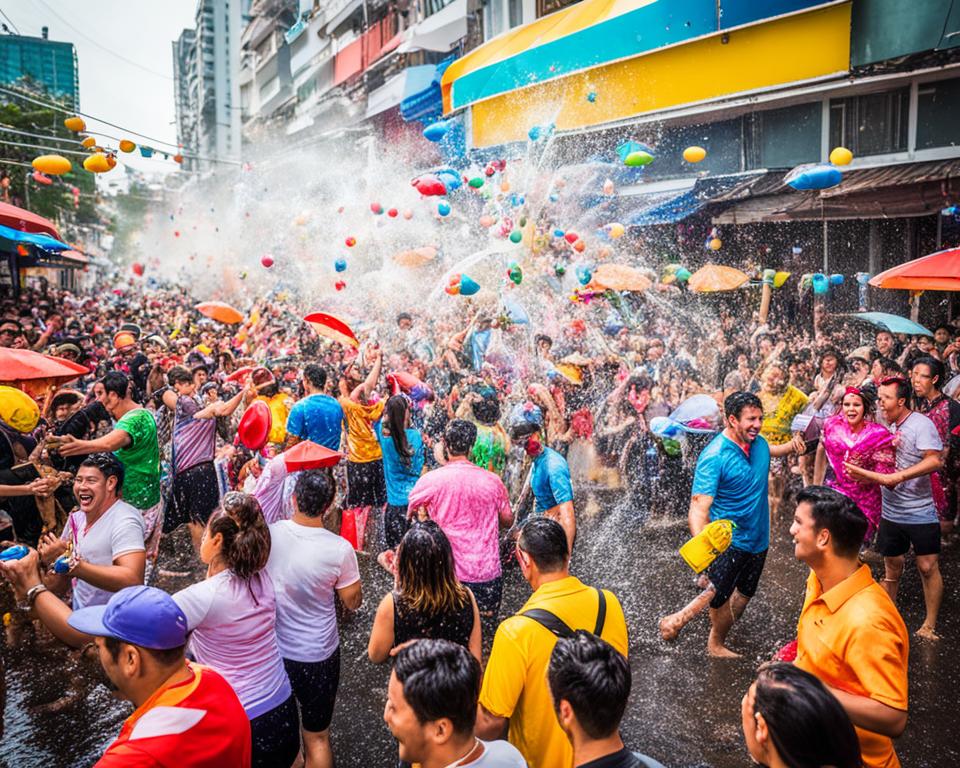
happy songkran day
“Happy Songkran Day!” is a common greeting exchanged during the Thai New Year festival. This wish conveys the spirit of joy, renewal, and good fortune that Thais hope to experience in the coming year. The Songkran celebrations are a time for family and friends to come together, participate in traditional rituals, and create cherished memories. Whether it’s splashing water, making merit at temples, or enjoying delicious Thai cuisine, Songkran is a vibrant celebration of Thai culture and a chance to embrace the fresh start of the new year.
| Songkran Greetings | Songkran Wishes | Songkran Celebrations |
|---|---|---|
| “Happy Songkran Day!” | Joy, renewal, good fortune | Water splashing, temple visits, traditional cuisine |
| Conveys the spirit of the festival | Aspirations for the new year | Vibrant celebrations of Thai culture |
| Common greeting among Thais | Bring families and friends together | Embrace the fresh start of the new year |
“Songkran is a vibrant celebration of Thai culture and a chance to embrace the fresh start of the new year.”
- Happy Songkran Day greetings
- Songkran wishes for joy, renewal, and good fortune
- Songkran celebrations of water splashing, temple visits, and traditional cuisine
Songkran Safety and Etiquette
While the Songkran festival is a joyous celebration, it is crucial for participants to follow appropriate etiquette and safety guidelines. Respect for elders and Buddhist monks is paramount during the festivities.
Respecting Elders and Monks
When pouring water over the hands of elders or Buddha statues, one should do so gently and with a reverent demeanor. It is also essential to avoid any disrespectful behavior towards religious figures or sacred spaces.
Staying Safe During Water Fights
During the exuberant water fights, participants should be mindful of their surroundings and take necessary precautions to stay safe. This includes avoiding water fights near busy roads and using appropriate protective gear, such as eye protection, to ensure a fun and accident-free Songkran celebration.
Traditional Thai Dishes for Songkran
Songkran celebrations are also marked by the abundance of delicious Thai cuisine. Traditional dishes served during the songkran traditional thai dishes festival hold symbolic meanings and are often tied to the themes of renewal and prosperity.
Popular Songkran foods include khao chae, a fragrant rice dish served in floral-scented water, and various sweets and desserts such as khao niaow ma muang (sticky rice with mango) and thong yip (golden egg yolk dumplings). These songkran symbolic foods and songkran desserts are not only delicious but also represent the aspirations for a bountiful and auspicious new year. Sharing these culinary delights with family and friends is an integral part of the Songkran festivities.
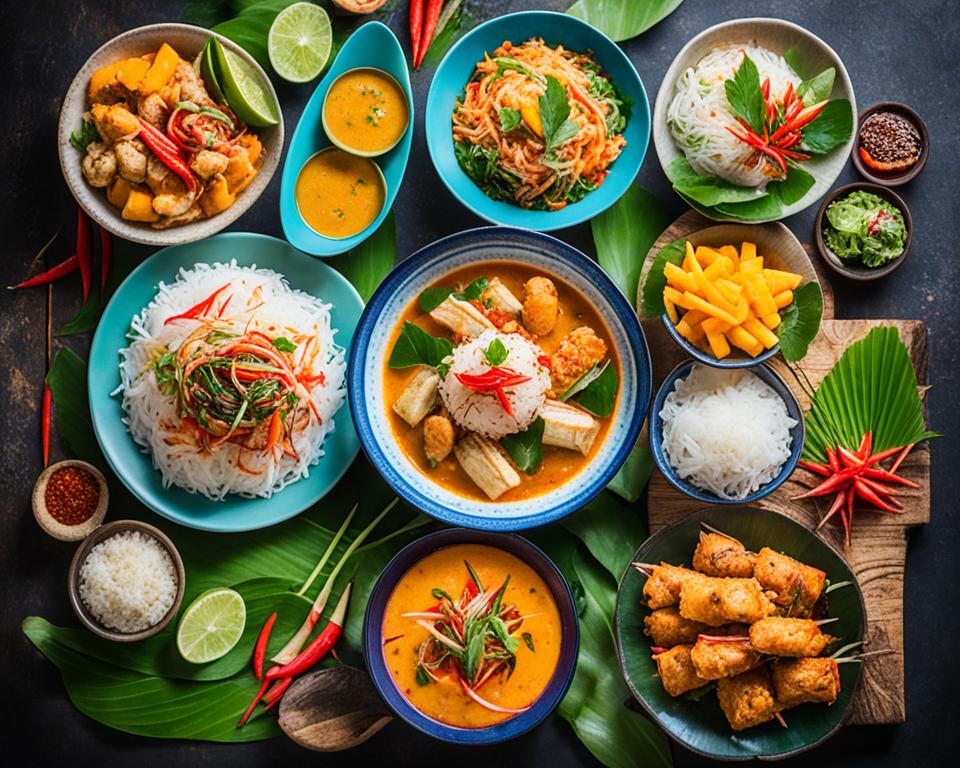
Songkran Festivities Around the World
While Songkran is primarily celebrated in Thailand, the Thai New Year festival has gained global recognition, with many Thai communities around the world hosting their own Songkran celebrations. From the United States to Europe, and even as far as Australia, Thai expats and their families come together to observe the traditional rituals, participate in songkran water fights, and enjoy Thai cuisine.
Thai Communities Abroad
These international Songkran festivals not only serve as a way to preserve Thai cultural heritage but also provide an opportunity for Thai communities to connect with their roots and share their rich traditions with the broader global community. Whether it’s the vibrant water-splashing activities or the reverent merit-making ceremonies, Songkran celebrations outside of Thailand offer a glimpse into the enduring spirit of the Thai people and their commitment to preserving their cultural identity.
From the lively Songkran festivals in major cities like Los Angeles and London to the intimate gatherings in smaller Thai enclaves, these international celebrations showcase the adaptability and resilience of Thai traditions. As Thai communities abroad continue to honor the Songkran festivities, they not only strengthen their own sense of identity but also share the beauty and significance of this unique cultural celebration with the world.
Eco-Friendly Songkran Celebrations
In recent years, there has been a growing effort to promote more eco-friendly Songkran celebrations in Thailand. Concerned about the environmental impact of the vast amounts of water used during the festivities, local authorities and community groups have implemented various initiatives to reduce water consumption and minimize waste. Some of these efforts include encouraging the use of recycled or biodegradable water containers, promoting the use of water-efficient spray guns, and organizing water-saving campaigns.
By embracing sustainability, Songkran can continue to be celebrated in a way that respects the environment and ensures the festival’s longevity for generations to come. These eco-friendly Songkran practices not only help conserve water but also contribute to reducing the overall environmental impact of the celebrations, making them more sustainable for the future.
| Eco-Friendly Songkran Initiatives | Impact on Sustainability |
|---|---|
| Use of recycled or biodegradable water containers | Reduces waste and promotes environmental conservation |
| Promotion of water-efficient spray guns | Helps conserve water during the festivities |
| Water-saving campaigns | Encourages sustainable water usage and reduces environmental impact |
By embracing these eco-friendly Songkran initiatives, the Thai people and local communities can continue to celebrate this cherished sustainable songkran tradition while preserving the natural resources and protecting the environment for the future.
Songkran’s Impact on Tourism in Thailand
Songkran, the Thai New Year festival, is a major driver of tourism in Thailand, attracting millions of visitors from around the world each year. The vibrant water festivities, captivating cultural performances, and time-honored traditional rituals appeal to travelers seeking to immerse themselves in the rich tapestry of Thai culture and experience the country’s unique celebrations.
The Songkran holiday, which typically falls during the shoulder season for tourism, helps boost the local economy by drawing crowds to popular destinations and generating increased demand for accommodations, transportation, and tourism-related services. The festival’s enduring popularity has also led to the development of specialized Songkran-themed tour packages, further solidifying Thailand’s reputation as a prime destination for cultural and experiential travel.
| Songkran’s Impact on Thailand Tourism | Key Figures |
|---|---|
| Annual Visitors During Songkran | Millions |
| Contribution to Shoulder Season Economy | Significant |
| Growth in Songkran-Themed Tour Packages | Steady Increase |
| Thailand’s Ranking as a Cultural Travel Destination | Top 10 |
Songkran’s enduring appeal as a cultural festival and the unique experience it offers travelers have solidified Thailand’s reputation as a premier seasonal travel destination, contributing to the country’s vibrant tourism industry and economic growth.
Unique Songkran Traditions Across Thailand
While Songkran celebrations share common themes and traditions across Thailand, each region and province often has its own unique customs and practices. For example, in the northern city of Chiang Mai, the locals participate in the ritual of “bathing the Buddha” by pouring scented water over sacred statues, a tradition that dates back centuries. In the southern province of Phuket, Songkran is celebrated with a vibrant parade featuring colorful floats, traditional dancers, and elaborate costumes.
In the northeastern region of Isaan, the Songkran festival is marked by the making of traditional sticky rice dishes and the release of floating lanterns. These regional variations showcase the cultural diversity and rich heritage that contribute to the overall tapestry of Songkran traditions in Thailand and its regional songkran variations.
| Region | Unique Songkran Traditions |
|---|---|
| Northern Thailand (Chiang Mai) | Bathing the Buddha: Pouring scented water over sacred statues, a centuries-old ritual |
| Southern Thailand (Phuket) | Vibrant Songkran Parade: Colorful floats, traditional dancers, and elaborate costumes |
| Northeastern Thailand (Isaan) | Making Traditional Sticky Rice Dishes and Releasing Floating Lanterns |
These regional variations showcase the cultural diversity and rich heritage that contribute to the overall tapestry of Songkran celebrations in Thailand.
Planning Your Songkran Adventure
If you’re eager to experience the vibrant Songkran festivities in Thailand, it’s essential to plan your trip carefully. The official Songkran holiday takes place from April 13th to 15th each year, but the celebrations often begin a few days earlier and can last up to a week. This is the best time to visit Thailand for Songkran, as you’ll be able to fully immerse yourself in the exhilarating water fights, captivating cultural events, and traditional rituals.
Best Time to Visit Thailand
The best time to visit Thailand for Songkran is typically during the mid-April period, as this is when the official holiday takes place. By traveling during this timeframe, you’ll have the opportunity to witness and participate in the vibrant water-splashing activities, cultural performances, and time-honored traditions that make Songkran such a unique and unforgettable experience.
Accommodation and Travel Tips
When planning your Songkran trip, it’s important to book your accommodations well in advance, as the Songkran holiday is a peak travel season in Thailand. Consider exploring Songkran accommodations in popular destinations like Bangkok, Chiang Mai, or Phuket to ensure you have a comfortable and convenient base for your celebrations.
Additionally, be mindful of local transportation during the Songkran festivities and consider using public options like taxis, tuk-tuks, or the BTS Skytrain in Bangkok to navigate the crowded streets. This will not only help you avoid the traffic and chaos but also allow you to fully immerse yourself in the festivities without the hassle of driving.
Conclusion
Songkran, the Thai New Year festival, is a celebration that embodies the rich cultural heritage, spiritual beliefs, and festive spirit of Thailand. From the vibrant water-splashing activities to the reverent merit-making rituals, Songkran offers a unique and unforgettable experience for both locals and visitors. By participating in the festivities, one can gain a deeper appreciation for the traditions that have been passed down through generations and the importance of maintaining cultural identity in a rapidly changing world.
Whether you’re drawn to the energy of the water fights, the tranquility of the temple visits, or the flavors of the traditional Thai cuisine, Songkran is a testament to the enduring spirit of the Thai people and a celebration that continues to captivate and delight all who experience it. For those considering a trip to Thailand, the Songkran festival provides an excellent opportunity to immerse oneself in the country’s rich culture and witness the vibrant celebrations that have become an integral part of Thai identity.
Ultimately, Songkran is more than just a festival; it is a celebration of the essence of Thailand, a time-honored tradition that has withstood the test of time and continues to be cherished by locals and visitors alike. By embracing the spirit of Songkran, one can gain a deeper understanding and appreciation for the enduring cultural heritage of this remarkable country.
